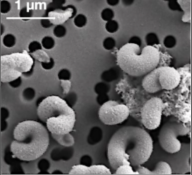Blue carbons refer to any carbon stored in the ocean. Each year brown algae, sea weeds and diatoms blooms inject gigatons of fucoidan (~660gt) and laminarin (12 ± 8 gt) in the form of dissolved organic matter (DOM) in the ocean. Over the years there is a strong interest in understanding the long-term sequestration of blue carbon. While research on blue carbon is growing, there are still gaps in our understanding of the carbon dynamics in these ecosystems. Better data on the rates of carbon sequestration, storage capacities, microbial respiration, and the impacts of different stressors are needed to inform effective management and policy decisions.
At Hampton University, my research focuses on the ecophysiology of marine microbes like Cylobacterium marinum (CM), a non-model bacterium that breaks down fucoidan and laminarin. We employ a multi-omics approach to explore how CM respond to different carbon sources, aiming to answer several questions:
1. How conserved are the metabolic pathways for degrading complex polysaccharides across different microbial species?
2. Which genes are differentially expressed at RNA and protein levels when switching between simple and complex carbon sources?
3. What response regulators and sensors detect changes in oceanic DOM?
4. Are there varying pathways for breaking down complex polysaccharides in marine environments?
5. Does the diversity of metabolic pathways reflect the structural diversity among complex polysaccharides?
Research and teaching are intertwined, offering a platform to train the next generation. As an educator, I aim to engage students in cutting-edge research, fostering creativity, critical thinking, and a strong science identity. In 2022, we secured funding to revamp the BS (Biology) curriculum, introducing two courses that provide an extended Course-based Undergraduate Research Experience (eCURE). Students enrich and isolate diverse microbial species, characterize them, and assemble their genomes using RNA sequencing data from the cultures they developed. Additionally, I am committed to mentoring undergraduates, promoting diversity in STEM, and supporting underrepresented groups in their scientific pursuits.

